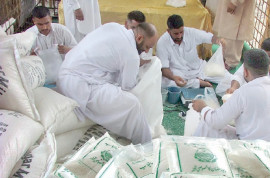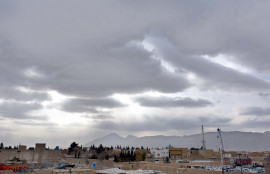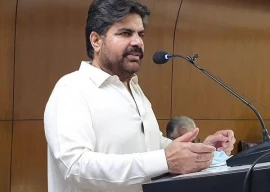
Ever felt kind of numb when someone has said: 15 people were gunned down in Karachi? Dr Rubina Saigol may be able to partly explain this phenomenon: facts don’t speak for themselves.
While much more may be at work behind our reaction to Karachi’s quotidian of violence, Saigol’s words offer some insight into our perspectives and attitudes towards knowledge. “Information is not knowledge,” she declared.
Saigol, an independent researcher in Lahore with a PhD in education and an MA in development psychology, was speaking at Habib University’s debut conference on postcolonial higher education on Saturday. Her well-received talk, which followed on the theme of the commodification of knowledge presented by keynote speaker Dr Farid Panjwani of the University of London, laid bare the giant machinery of what higher education has become.
In true Foucauldian fashion, Saigol started with the genealogy of knowledge. In simple this was a bird’s-eye view of the evolution of social sciences.
A long, long time ago, there was no separation of the physical and moral universe. Think of scholars such as Ibn-e-Khaldun who were philosophers and physicists. But then we moved (in Cartesian fashion) to the dichotomy of the mind/body and (in Catholic tradition) the soul versus the body.

“In more recent times this fragmentation has been challenged,” she said, referring to the last 30 to 40 years. We started thinking holistically; knowledge of the world should not be compartamentalised. Foucault divided the social sciences into three fundamentals: life, labour and language (read biology, economics and linguistics).
But now, said Saigol, there is so much specialisation that areas of knowledge are becoming smaller and smaller. “Knowledge has declined in the modern era and in its place [we have] an exponential rise in unrelated bits of information.”
The problem in Pakistan is that there has been an over-emphasis on the hard sciences. Saigol evidenced this by citing that the Higher Education Commission, until recently, gave 80% of its funding to the hard sciences and only 20% to the social sciences. And while this is more of a global example, she mentioned the largest industry, the armament industry (that makes guns, bombs); it certainly doesn’t need social sciences graduates. This partly explains why in so many cases and countries there is less investment in the humanities: Social sciences do not produce weapons, armaments, machines, computers, etc.
And returning to her original point, she said that with the rise of IT, people take information for knowledge. With a decline of social sciences there has been a rise in business education. “But this creates a society of technicians,” she argued. Humanities subjects, courses, departments keep closing and more universities offer IT, business administration subjects. Social sciences are less useful in trade and commerce and not directly profit-oriented.
Of course, this suits the neoliberals just fine. They want to create “efficient workers who do not know their place in the social hierarchy”. Literature would have challenged this, but it’s not being taught like before. “We are becoming dehumanised because we don’t teach good literature any more,” she said.
And if you argue back that well, there are subjects like psychology that are becoming more popular, Saigol would chillingly remind you that its graduates help advertising create a “good working class that will produce for you”. So social sciences are used in business and administration to control consumer behavior.
If you mention anthropology, Saigol has a similar answer. “Anthropology is a colonial discipline,” she said, referring to some of the first big names. And today, they are embedding with the US army to study different tribes, go to Afghanistan.
These examples buttress her argument that the social sciences are producing a large number of “State intellectuals”. They contrast with what you would call “Organic intellectuals” or people who are connected to movements, like for the peasants or haris. She warned that States and the ruling classes discourage critical thinking. The beauty or saving grace is, however, that social conflict increases knowledge. One type of knowledge becomes hegemonic until someone else comes along to contest it. Take Columbus. He was eulogised for discovering America until the indigenous people challenged this knowledge
Published in The Express Tribune, October 20th, 2013.


















COMMENTS
Comments are moderated and generally will be posted if they are on-topic and not abusive.
For more information, please see our Comments FAQ